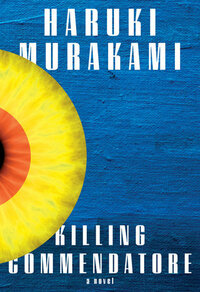Take a photo of a barcode or cover
an incredible read with moments of feeling like Pans Labyrinth, if it were told from the perspective of a teacher in the village. I have a deep appreciation for the authors ability to describe art and music and transport you to the way they make people feel. It's incredible, to have a piece of art so vivid in your mind, when it truly is a construct of words within a novel, nothing visual, but the mind creates.
3 and a half stars, really.
What a ride this book is! That’s always the case with Murakami, you never know where he will take you.
The worlds he creates are fascinating and I invariably finish his books thinking I wish I could write (and imagine) these crazy, extraordinary, wonderful things!
I wish I knew how to give my ideas and metaphors life!
What a ride this book is! That’s always the case with Murakami, you never know where he will take you.
The worlds he creates are fascinating and I invariably finish his books thinking I wish I could write (and imagine) these crazy, extraordinary, wonderful things!
I wish I knew how to give my ideas and metaphors life!
challenging
dark
emotional
inspiring
mysterious
reflective
slow-paced
Este nuevo libro de Murakami nos lleva a la historia del protagonista (una vez más, anónimo), un pintor de retratos en pleno proceso de divorcio. Después de que su mujer le diga que no quiere seguir viviendo con él, decide mudarse a una casa de la montaña que le deja un viejo amigo. Allí conocerá a un misterioso ricachón que le pedirá diversos retratos. También, cómo no, hay diversos elementos de realismo mágico, como una especie de idea parlante, y también un misterioso sobre un pintor en sus últimas horas que envuelve el libro.
Si te gusta el estilo de Murakami, te parecerá un libro sumamente interesado, pero entiendo que a algunas personas les pueda parecer raro y aburrido. No es mi caso. Lo único que no me ha gustado es ese cliffhanger del final, sabiendo además que aún no tengo el segundo...
Si te gusta el estilo de Murakami, te parecerá un libro sumamente interesado, pero entiendo que a algunas personas les pueda parecer raro y aburrido. No es mi caso. Lo único que no me ha gustado es ese cliffhanger del final, sabiendo además que aún no tengo el segundo...
Un excelente Murakami, a la espera del segundo libro. Una historia de reflexión personal en el mundo algo inquietante tan habitual del autor.
Mi reseña: https://youtu.be/rew64vQDabI
Mi reseña: https://youtu.be/rew64vQDabI
mysterious
reflective
slow-paced
Plot or Character Driven:
A mix
Strong character development:
No
Loveable characters:
Complicated
Diverse cast of characters:
Yes
Flaws of characters a main focus:
Yes
Once again Murakami has crafted a strange and magical yet mundane world. While it was wonderful living in this book's pages, in classic Murakami fashion it went at a glacial pace with no real resolution, and for the first time it somewhat bothered me. Not his best, but a good one for sure.
dark
mysterious
slow-paced
Plot or Character Driven:
Character
Strong character development:
Complicated
Loveable characters:
Complicated
Diverse cast of characters:
Yes
Flaws of characters a main focus:
Complicated
Probably one of my favorite Murakami books. Less misogynic-fueled narrative, a lot of suspense, not too much suspense, balanced by Murakami's delicate imagery. Good, good.
It took me about two weeks to finish reading Killing Commendatore and maybe if this wasn't a Murakami book I'd just say 'fuck it' and give it up after the first week. In a way I actually enjoyed taking my time reading this and be immersed in this world with these enigmatic characters. For me this is not the kind of book where I can just simply get in and get out of in the matter of days. It has that suspense and slow build which somehow felt better to prolong because I felt like I was being taken somewhere by the author, like he's telling me 'calm down, just listen because I'm about to tell you something' and that was definitely the case with most of his previous books that I've read and that's why I waited. However, with this one.. the wait didn't get anywhere. It was building up to something but that something never came. The ending felt somewhat incomplete and I can't help but feel disappointed. Where were we supposed to go? What were any of those things supposed to lead up to? I don't think we ever arrived to a satisfactory destination and I'm just confused as hell at this point because we spent such a big chunk of the book getting to know this mysterious Menshiki, Mariye, the Commendatore etc. and for the ending to not have anything to do with those characters is just... I mean I guess it was a choice?? We don't even get to see the unnamed protagonist's growth per se as a character or as an artist and it makes me think, 'then what the fuck is the point of this book?'
I also found that the older I get the more uncomfortable I am with how Murakami describes women and girls to the point that whenever I get to those parts of his books I'm always reminded of that one Tumblr post that shows an example of how male writers write about women and it's comically on point because they somehow can always manage to reduce women's personality and entire existence to one single thing only: boobs.
Overall I didn't hate this book up till the middle, then it got really repetitive and it led up to a disappointing ending hence why I rated it 2.5/5.
I also found that the older I get the more uncomfortable I am with how Murakami describes women and girls to the point that whenever I get to those parts of his books I'm always reminded of that one Tumblr post that shows an example of how male writers write about women and it's comically on point because they somehow can always manage to reduce women's personality and entire existence to one single thing only: boobs.
Overall I didn't hate this book up till the middle, then it got really repetitive and it led up to a disappointing ending hence why I rated it 2.5/5.




